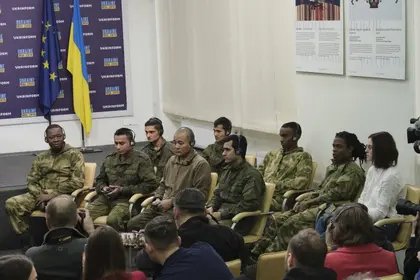The quest for higher-paying jobs to achieve a better standard of living has led citizens from low-income countries to fall under Russian influence and become involved in the war in Ukraine. This trend is evident in the stories of mercenaries from countries of the Global South who are currently held captive in Ukraine.
Citizens of foreign countries, in particular Nepal, Cuba, Sierra Leone, Somalia, told the stories of how they had found themselves in the war against Ukraine as part of the Russian army, during a briefing at Media Center Ukraine – Ukrinform on March 15.
JOIN US ON TELEGRAM
Follow our coverage of the war on the @Kyivpost_official.
20-year-old Adil came to Russian with a dream
“I came to Russia with a good dream to raise my family in a good situation in the future, I just tried to get a normal job. But when I saw the army in Russia, they showed me the big dream that I would be taking my family to a good future. I didn’t know that I would be in the first line. So, I was just dropped there without knowing the language, the language is the most difficult problem. If I knew the language very well, I would not have been in the first line, because I would have quit.”
Dario from Cuba found himself in the Russian army because he needed money for his family
Back at home, in Cuba, he saw a job ad on Facebook looking for construction workers.
Dario filled out the form and went to Russia, but he had no idea nor intention to go to war. As soon as Dario arrived in Moscow, he was sent to war.
32-year-old Bikash from Nepal joined the war after seeing a video on TikTok
“I was in Russia, of course, for the money. And how I came to Russia is through a tourist visa,” said the mercenary.
Bikash said that while he was still in Nepal, he came across a video featuring the Russian military in TikTok, so he contacted them about work. In the conversation, he was told that he would not be sent to the front, but instead he would work in a field hospital, or deal with supplies or logistics.
Richard from Sierra Leone wanted to support his and his brother’s families
Before joining the war as part of the Russian army, the man worked as an estate manager in his home country. However, he wanted to support his own family as well as the family of his younger brother, who had died, so he went to Russia to find work.
However, after arriving in the Russian federation via a tourist visa, and contacting the Russians about finding a job, the man was sent to war.
After recounting their experiences, captured mercenaries urge their compatriots not to enlist in the Russian army, emphasizing that such a choice will not lead to the fulfillment of their dreams
In addition, Petro Yatsenko, representative of the Coordination Headquarters for the Treatment of Prisoners of War, explained that these people are an example of classic mercenary recruitment practice, because very good money is promised to people who have nothing to do with the armed conflict in Ukraine, citizens of other countries, people with a very low income who are ready for anything.
“For example, $200 a month is enough to live well in Somalia – this allows maintaining a good standard of living. And when the Russians offer such people USD 2,000 a month and say that they will actually be used as bodyguards or placed at the third line from the front, the temptation is very great for them. And these people are ready to do anything to get some money,” explained the representative of the Coordination Headquarters.
He emphasized that the life of these people means very little for the Russians.
“In fact, the life expectancy of such an infantryman on the front line is not days, but hours. Therefore, the life of these people is very cheap for the Russians. And few of them receive any of the promised money because most of them will either die, or they will simply be tricked,” added Petro Yatsenko.
The Media Center Ukraine focuses on working with foreign journalists, establishing effective communication between government, business, and the public sector, as well as creating an expert environment to develop effective communication strategies to help Ukraine win the war and recover afterwards. It has four representative offices in Kyiv, Lviv, Kharkiv and Odesa.
See the original here.
You can also highlight the text and press Ctrl + Enter



